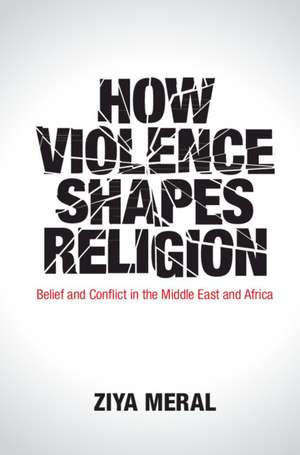How Violence Shapes Religion: Belief and Conflict in the Middle East and Africa
Autor Ziya Meralen Limba Engleză Hardback – 22 aug 2018
| Toate formatele și edițiile | Preț | Express |
|---|---|---|
| Paperback (1) | 262.00 lei 39-44 zile | |
| Cambridge University Press – 22 aug 2018 | 262.00 lei 39-44 zile | |
| Hardback (1) | 492.41 lei 6-8 săpt. | |
| Cambridge University Press – 22 aug 2018 | 492.41 lei 6-8 săpt. |
Preț: 492.41 lei
Preț vechi: 553.27 lei
-11% Nou
Puncte Express: 739
Preț estimativ în valută:
94.22€ • 98.18$ • 78.02£
94.22€ • 98.18$ • 78.02£
Carte tipărită la comandă
Livrare economică 03-17 aprilie
Preluare comenzi: 021 569.72.76
Specificații
ISBN-13: 9781108429009
ISBN-10: 1108429009
Pagini: 224
Dimensiuni: 157 x 235 x 15 mm
Greutate: 0.5 kg
Editura: Cambridge University Press
Colecția Cambridge University Press
Locul publicării:Cambridge, United Kingdom
ISBN-10: 1108429009
Pagini: 224
Dimensiuni: 157 x 235 x 15 mm
Greutate: 0.5 kg
Editura: Cambridge University Press
Colecția Cambridge University Press
Locul publicării:Cambridge, United Kingdom
Cuprins
1. Introduction; 2. Religious violence in Nigeria; 3. Religious violence in Egypt; 4. Comparative analysis of violence in Nigeria and Egypt; 5. Religion and violence in a global age.
Recenzii
'Ziya Meral challenges our assumptions about religious violence, drawing from a broad range of scholarship and grounding it all on a deep analysis of case studies in Nigeria and Egypt. The result is a fascinating reminder of how narratives promoted particularly in the West impact local conflicts and narrow our understanding of the relationship between religion and violence in human history.' Reza Aslan, author of Zealot and God: A Human History
'Ziya Meral has written an eye-opening study that explains how religion and violence interact in conflicts, particularly in Africa and the Middle East. It challenges the reader to think beyond common arguments that either make religion the cause of violence or brush away the role played by religion in violent conflicts. It is a must-read for anyone who seeks a deeper understanding of this complex topic.' Hassan Hassan, co-author of ISIS: Inside the Army of Terror
'A fascinating book which highlights the need for the West to recognize the critical relevance of religion in the twenty-first-centuary world. Ziya argues that religion permeates and resonates with profound significance across the world view of billions of people, shapes our understanding of an uncertain world, with alternately constructive and highly destructive narratives. We should never be surprised by the human capacity to tend towards violence. It is in our fallen human nature. But the true beauty of this book lies in the account that, through networks and the communities of the faithful, extraordinary stories of forgiveness, truth and reconciliation can be found, yielding the very foundations for re-building broken lives.' Justin Welby, Archbishop of Canterbury
'In How Violence Shapes Religion, Ziya Meral turns conventional assumptions about the relationship between religion and militancy on their head. His careful and thorough case studies demonstrate that the question - indeed, the very direction - of causality between faith and violence is anything but straightforward. This is a must-read for anyone - scholars, students, policymakers - wishing to understand the complex sociology of religion and violence in the contemporary world.' Peter Mandaville, George Mason University, Virginia
'Ziya Meral has written an eye-opening study that explains how religion and violence interact in conflicts, particularly in Africa and the Middle East. It challenges the reader to think beyond common arguments that either make religion the cause of violence or brush away the role played by religion in violent conflicts. It is a must-read for anyone who seeks a deeper understanding of this complex topic.' Hassan Hassan, co-author of ISIS: Inside the Army of Terror
'A fascinating book which highlights the need for the West to recognize the critical relevance of religion in the twenty-first-centuary world. Ziya argues that religion permeates and resonates with profound significance across the world view of billions of people, shapes our understanding of an uncertain world, with alternately constructive and highly destructive narratives. We should never be surprised by the human capacity to tend towards violence. It is in our fallen human nature. But the true beauty of this book lies in the account that, through networks and the communities of the faithful, extraordinary stories of forgiveness, truth and reconciliation can be found, yielding the very foundations for re-building broken lives.' Justin Welby, Archbishop of Canterbury
'In How Violence Shapes Religion, Ziya Meral turns conventional assumptions about the relationship between religion and militancy on their head. His careful and thorough case studies demonstrate that the question - indeed, the very direction - of causality between faith and violence is anything but straightforward. This is a must-read for anyone - scholars, students, policymakers - wishing to understand the complex sociology of religion and violence in the contemporary world.' Peter Mandaville, George Mason University, Virginia
Notă biografică
Descriere
Religion and violence are intrinsic to the human story. By tracing their roots in human experience, Meral reveals that it is violence that shapes religion.
